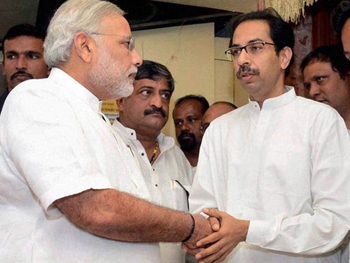Mumbai, Oct 7: The Shiv Sena on Monday asked Prime Minister Narendra Modi where his respect for Balasaheb Thackeray was when the BJP broke its alliance with the Sena over seat-sharing for the Maharashtra Assembly elections.

The Sena mouthpiece Saamna, in its editorial, said: “It is good that he respects the Shiv Sena supremo. Even we respect Mr. Modi. But where did this respect go when it broke the 25-year-old alliance? A more fitting tribute to Balasaheb Thackeray would have been the maintenance of the saffron alliance.”
The editorial claimed that the BJP was trying to loot Maharashtra. “What was the purpose of Gujarat Chief Minister Anandiben Patel’s visit to Mumbai recently? She told industrialists in Maharashtra to move base to Gujarat. This is trying to plunder Maharashtra,” it said. Maharashtra Navnirman Sena chief Raj Thackeray too had raised the same issue in his rally on Sunday.
The editorial also slammed the BJP for invoking Chhatrapati Shivaji, a State icon. Calling it “hypocrisy,” Saamna said those who did not celebrate Shiv Jayanti in their lifetime, now claimed the blessings of Shivaji Maharaj.
“The BJP might be armed with the power of money and intellect, and the art of backstabbing people, but Shivaji maharaj’s blessings are not so cheap. From where will you bring the valour?” the editorial asked.





Comments
Add new comment